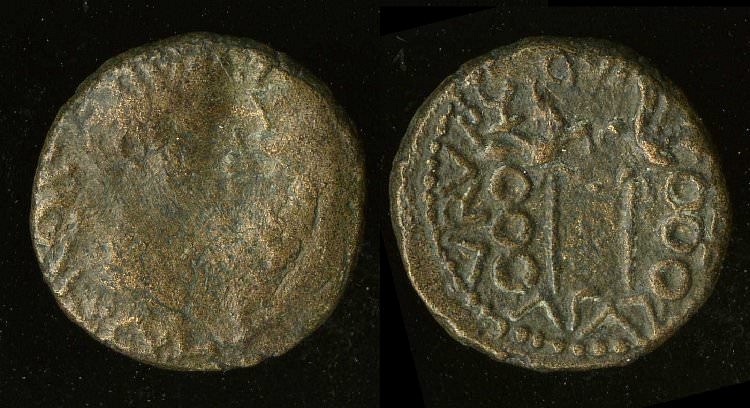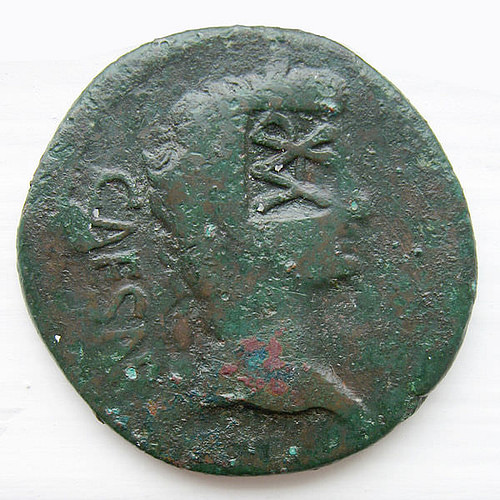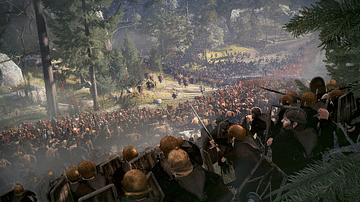
Publius Quinctilius Varus (c. 46 BCE – 9 CE) was a Roman politician and general under the rule of Emperor Augustus. He is most remembered for having lost three Roman legions when ambushed by Germanic tribes in the battle of Teutoburg Forest, which caused a great shock in Rome and effectively stopped Roman expansion beyond the Rhine River.
EARLY LIFE
Publius Quinctilius Varus was born c. 46 BCE in an old patrician family. His father, Sextus Quinctilius Varus, was a republican. Sextus was a quaestor in 49 BCE and defended the city of Corfinium from the siege of Julius Caesar during the civil war against Pompey. When Julius Caesar was assassinated, Sextus was at the battlefield of Philippi battling against Marc Antony and Octavian. As Marc Antony and Octavian defeated the last of the republicans, Sextus committed suicide.
Publius Quinctilius Varus had none of his father's republican tendencies. He became a political friend of Augustus and was made questor in c. 21 BCE. Varus married Vipsania Marcella Agrippina, daughter of Marcus Vipsanius Agrippa, the right-hand man of Emperor Augustus. He was made consul in 13 BCE along with Tiberius, the stepson of Augustus, who himself was married to one of Agrippa's daughters, Vipsania Agrippina. Later, Varus would marry Claudia Pulchra, Augustus' grandniece. Cassius Dio describes Varus as an incompetent military commander who was also naive and imperious. Velleius Paterculus assesses Varus as a quiet man who was slow and lazy. They viewed Varus as an administrator who advanced in his career from his close ties to Augustus.
CAREER
At the time of Varus' ascent of power in the Roman political world, the empire was preoccupied with two main conflicts, the Pannonian revolt and Maroboduus, one of the most powerful Germanic tribe leaders. The imperial elite was also well aware of the potential for unrest in newly conquered provinces. A governor not only needed to be someone who had proven they were capable of successful military command but also competent in settling and organizing a new province. Varus was granted governorship of Africa, a very prestigious position as it was one of the provinces ruled by the Senate, as well as the only one with a legion when all other garrisoned provinces were ruled by the emperor. Varus ruled this part of the Roman world in 8-7 BCE, putting his name on the coins of the two cities, Hadrumetum and Achulla. He was then reappointed as governor of Syria, where he had the command of one-sixth of the Roman army.
In 7 BCE, Varus arrived in Syria. Syria was one of the most important provinces of the empire as the four Roman imperial legions in Syria were the ones guarding the eastern frontier against the Parthians. The British Museum has an ancient coin with the inscriptions, “Imperator Caesar Augustus” round the head of the emperor and “Publius Quinctilius Varus,” with two eagles of the legion indicating the close ties between the two men.
As the governor of Syria, Varus was also responsible for the peace in the vassal kingdoms, which included Judaea. King Herod of Judaea had been Rome's closest and most loyal ally. At the end of his reign, Herod accused his son, Antipater – who was also his intended successor, of high treason. Varus supported the accusation, and Antipater was executed.
Herod died three years later. In his will, he divided his kingdom among his three surviving sons – Herod Archelaus, Herod Antipas, and Philip. Herod Archelaus received the region of Judaea and Samaria, Herod Antipas was given Galilee and Perea, and Philip became the ruler of Gaulanitis. Soon there were riots in the areas ruled by Archelaus. Archelaus' troops were unable to cope and Varus had to intervene. The cities of Sepphoris and Emmaus were destroyed, and 2,000 people were crucified. Herod Archelaus' territories were pacified and his reign could begin. After this crisis, Varus returned to Rome.
Varus entered Rome in the midst of a political change. Augustus had named his grandsons Gaius and Lucius as his successors. Tiberius had left Rome and lived in Rhodes. However, Augustus' new scheme was unsuccessful as both grandsons died within the space of less than two years from each other. Due to this family tragedy, Tiberius was recalled from Rhodes and was named as one of Augustus' successors. After the recall of Tiberius, Varus was appointed as governor of Germania c. 6 CE. His appointment was celebrated with a gift of money to the soldiers with coins marked with the sign VAR.
THE BATTLE OF TEUTOBURG FOREST
Tiberius toured through Germania in the autumn of 4 and the summer of 5 CE as a show of strength, for the Germanic tribes to understand and fulfill their obligations as a part of the Roman Empire. In 6 CE, he wanted to lead at least eight legions from the Middle Rhine and a unit against king Maroboduus of the Marcomanni in Boiohaemum (Bohemia).
At the same time, the three legions from the Lower Rhine were to move against Boiohaemum as well, attacking it along the Elbe. Their commander was Gaius Sentius Saturninus. A third army group was to march along the Main. A giant base was built near modern Marktbreit, where the army of the Middle Rhine would gather. However, nothing happened, because a rebellion in Pannonia obstructed the execution of Tiberius' plan and took three years to suppress. Varus replaced Saturninus and actively organized the conquered territories between the Rhine and the Elbe. He collected taxes, founded new settlements and administered justice when needed.
In the summer of 9 CE, Tiberius had defeated the Pannonians and was undergoing preparations to resume the offensive towards Bohemia and the Elbe in 10 CE. For those Germanic leaders who wanted to get rid of the Romans, it was time to act. Varus was in his summer quarters on the Weser river when the news arrived of a growing revolt in the Rhine area to the West. He then decided to march with three legions (the XVII, XVIII and XIX) and make a detour through the rebellious area before returning to the Rhine.
The only road led through a small strip of accessible land; to the south, there were the inaccessible hills of the Teutoburg forest, and marshes made progress to the north difficult. It was the perfect place to trap the heavy legionaries. The three legions, then, were in a position where their fighting strengths would be minimized. They were ambushed by Germanic tribes led by Arminius in the Battle of the Teutoburg Forest. Some Roman soldiers trying to flee were intercepted by the German tribesmen and killed. Some captured Romans were caged and burned alive while others were enslaved or ransomed. Tacitus and Florus report that the victorious Germanic tribes tortured and sacrificed captive soldiers to their gods. Modern archaeologists excavated a part of the battlefield, recovering many military objects and other objects attesting to the presence of civilians in the area at the time of the massacre. Varus, upon seeing that all hope was lost, committed suicide.
![Battle of Teutoburg Forest [Artist's Impression]](https://www.worldhistory.org/img/r/p/750x750/2255.png?v=1713913143)
After the battle, the Romans never conquered the Germans east of the Rhine despite the expeditions of Germanicus in 15-16 CE, and a few later conflicts. So great was the shame, and the ill luck thought to be connected to the numbers of the lost legions in the Battle of Teutoburg Forest, that the numbers XVII, XVIII and XIX never re-appear in the Roman Army's order of battle. According to Suetonius, Augustus tore his clothes and refused to cut his hair for months upon hearing the news. For years afterwards, Augustus was heard, upon occasion, to moan, "Quinctilius Varus, give me back my Legions!"
Arminius cut off Varus' head and sent it to Bohemia as a present to King Maroboduus to coax him into an alliance. Maroboduus declined the offer and sent Varus' remains to Rome. Despite his anger towards Varus over the total defeat at the Battle of Teutoburg Forest, Augustus buried Varus' head in the mausoleum of the imperial family.





